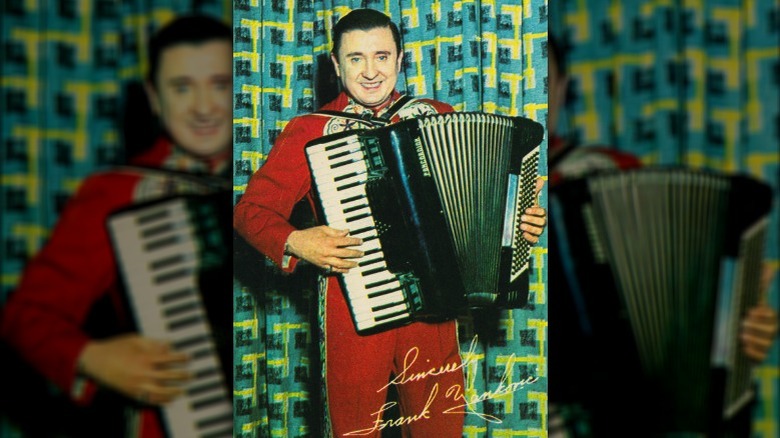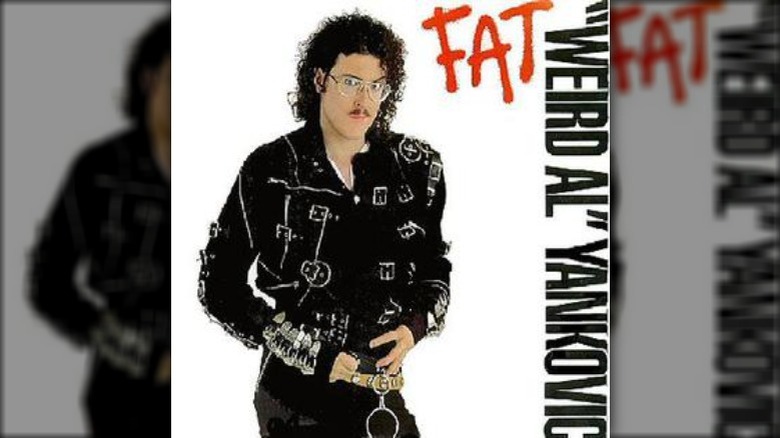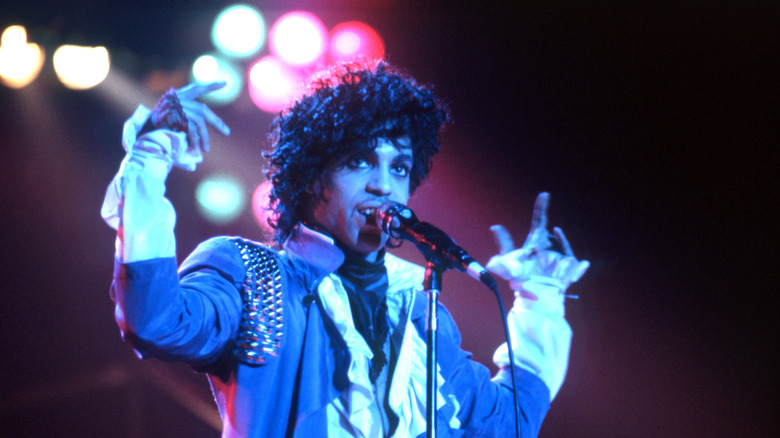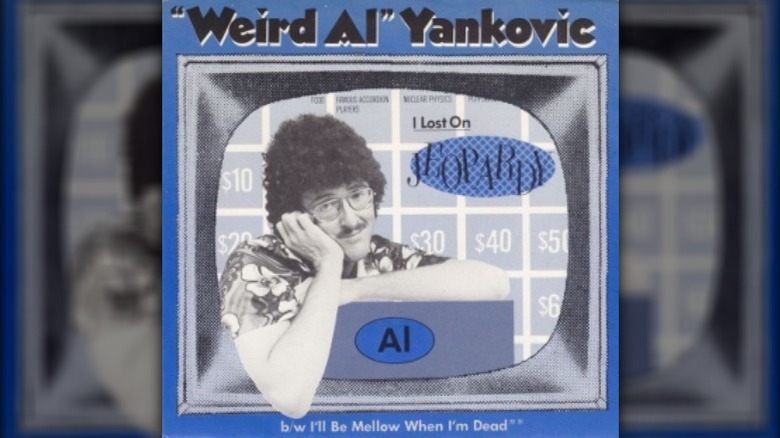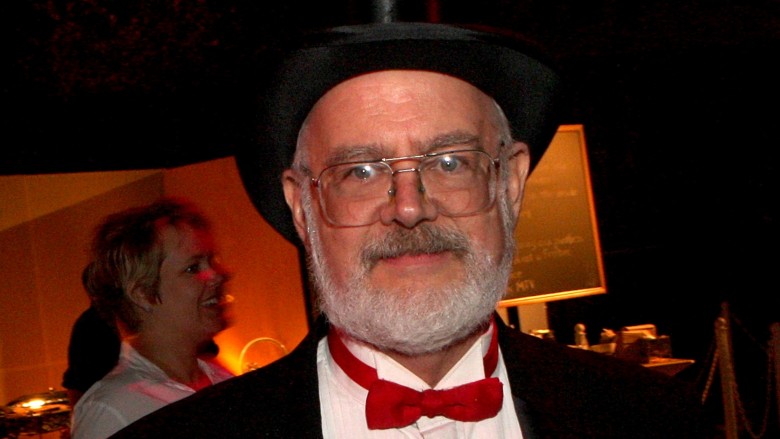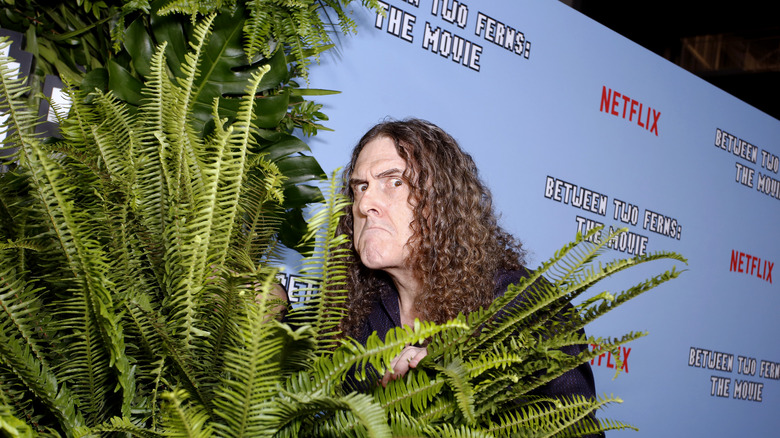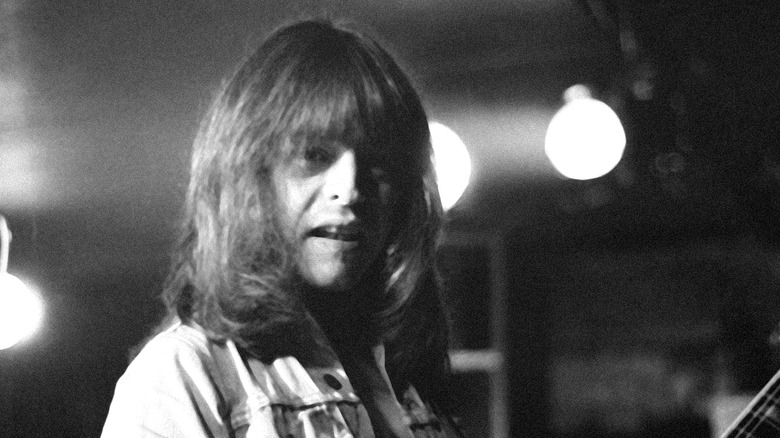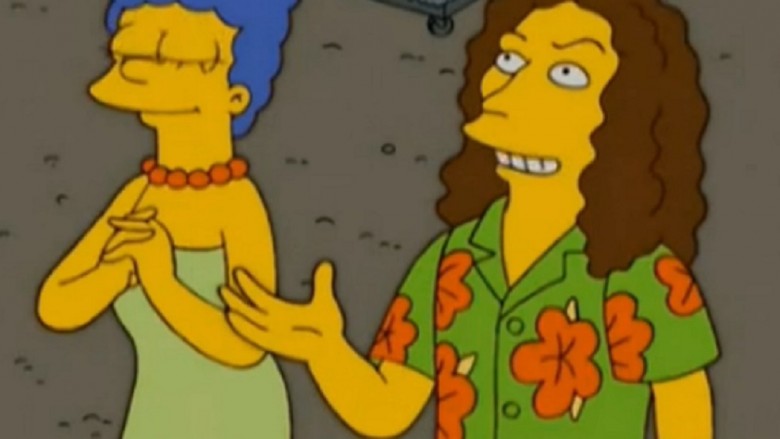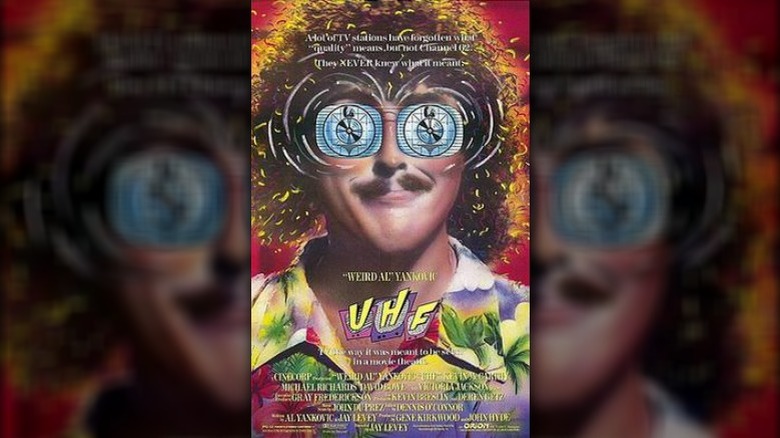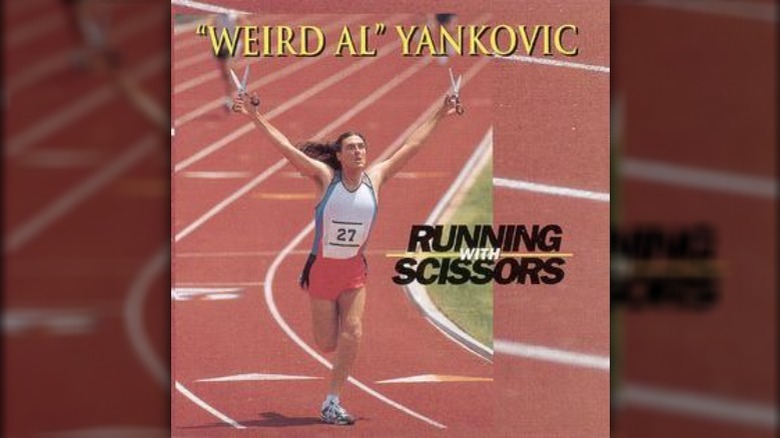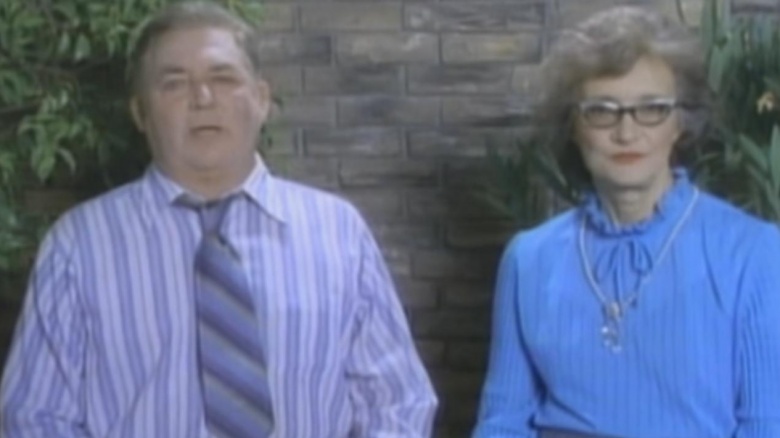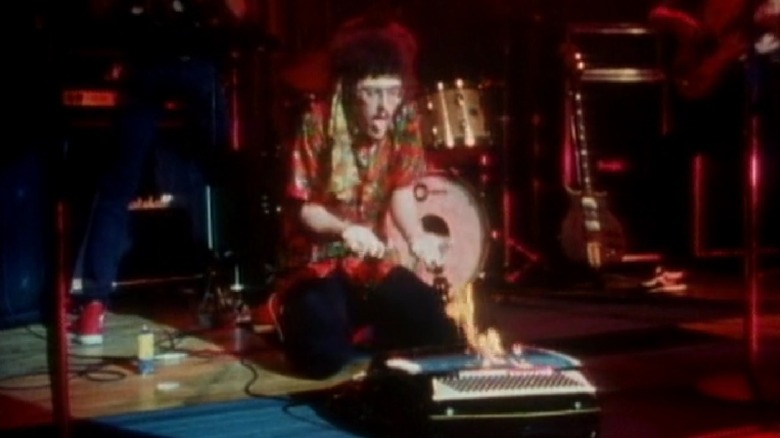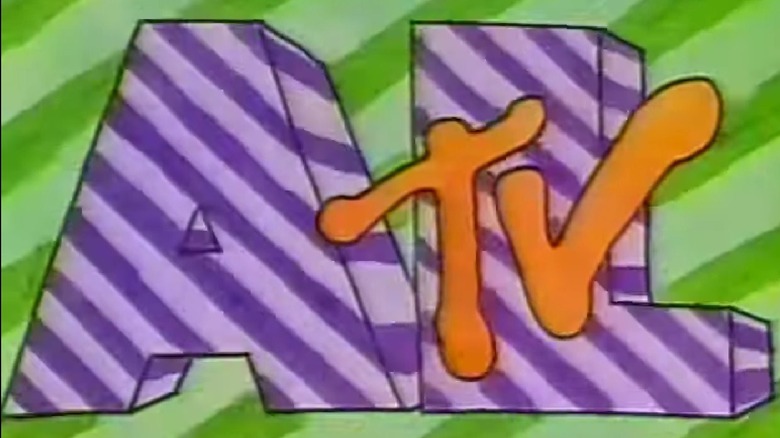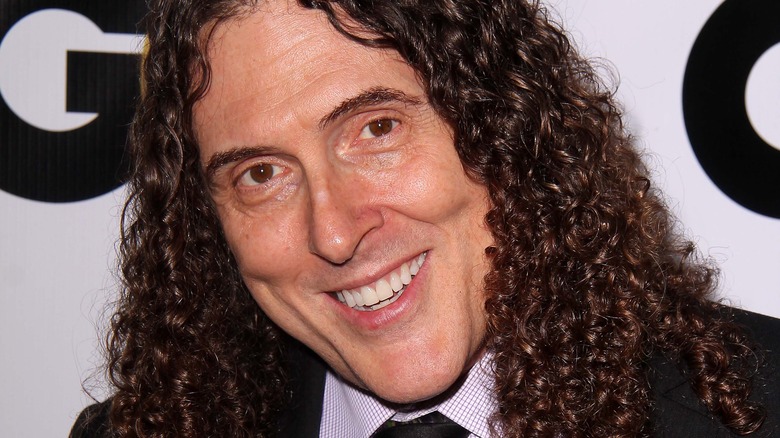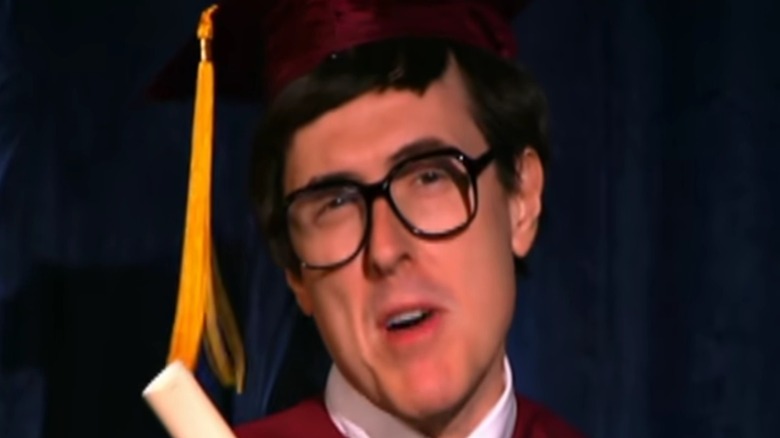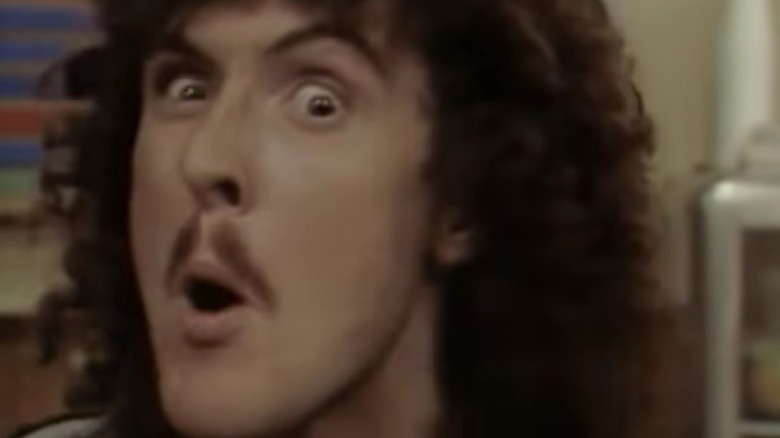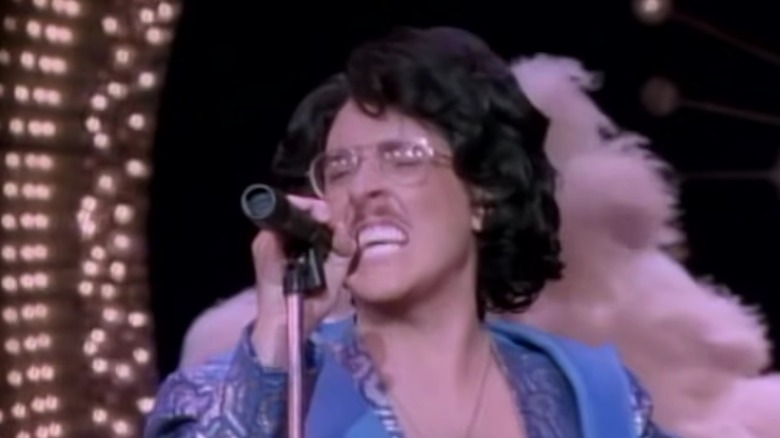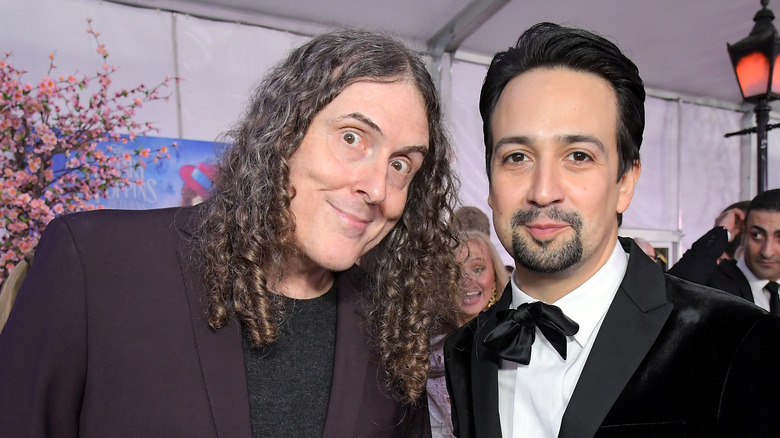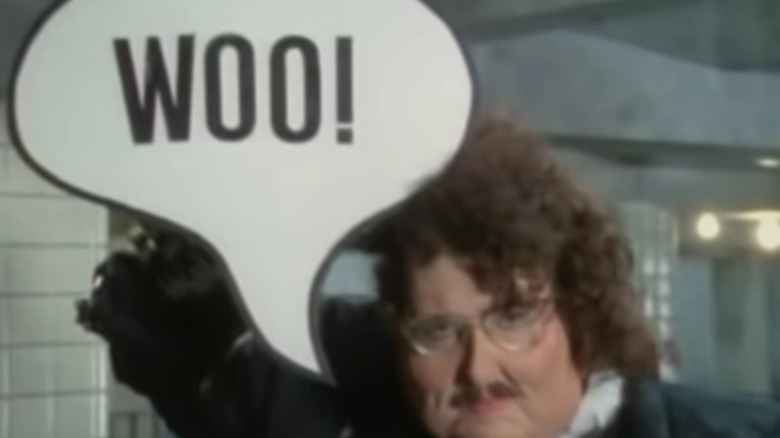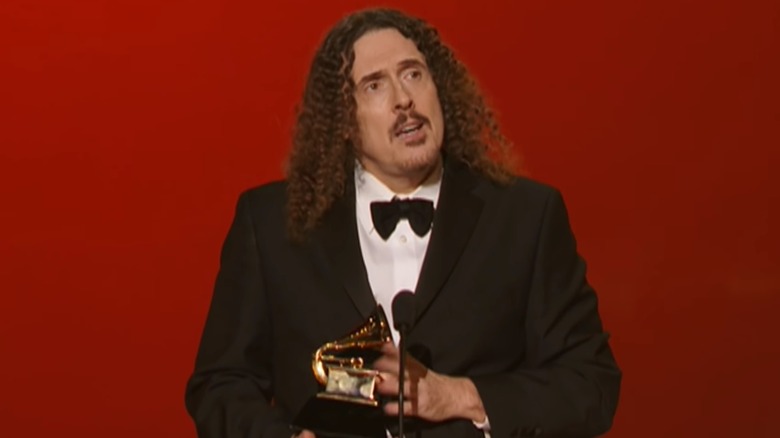The Untold Truth Of Weird Al Yankovic
Weird Al Yankovic is an odd superstar, but considering his dedicated fan base, a shelf full of major awards, and decades-long career that is seemingly going stronger than ever, superstar is the only accurate category for him. Nerdy, lanky, and armed with an ... accordion, of all things, Weird Al has carved a niche for himself in mainstream music that even the thousands of imitators on YouTube can't shift him from.
There's a striking lack of salaciousness about Weird Al Yankovic, which should come as no surprise to anyone who's caught his episode of "Behind the Music," where Al was baffled as to why such a controversy-free celebrity like himself would even be considered for the series. Still, just because there's an absence of scandal doesn't mean there isn't plenty of Al-formation that hasn't yet pervaded the mainstream consciousness. As such, each of the following truths about Weird Al should successfully make your head explode just like "Scanners."
Weird Al Yankovic is not related to Frankie Yankovic, America's Polka King
Given their shared last name, and a mutual gift for the accordion, it'd be reasonable for anyone to presume that Al and legendary polka man Frankie Yankovic are related, but they're not. They were, however, friends, which led to the two accordionists trading licks on Frankie's "Songs of the Polka King, Vol. 1" album.
But no matter how many times the question of Frankie's family connection to Al has been asked and answered, interviewers continue to ask him about it. As he clarified in a 2001 conversation with TheForce.net: "Sometimes after explaining to a reporter for the third time that Frankie wasn't my dad, I would read the article, and it would say, 'There's obviously a rift in the Yankovic family — Al won't even admit that Frankie's his father!'"
He's a legitimate academic (as well as musical) genius
Had Weird Al's unique skill as a parodist (and shockingly underrated prowess as a legitimate musician) failed to turn into a lifetime gig, there's no question that he was smart enough to make his way in some other field, as Today I Found Out explains. Al started kindergarten a year early, skipped second grade, graduated from Lynwood High School in Lynwood, California at 16, and went on to attend California Polytechnic State University in San Luis Obispo, where he received his bachelor's degree in architecture. Could we have had the next Frank Lloyd Wright on our hands? The world will never know.
Weird Al's gratitude to Michael Jackson has never wavered
It's a rare Weird Al interview that doesn't find him acknowledging how he effectively owes his career to Michael Jackson, first for letting him parody "Beat It" as "Eat It," and then for letting him transform "Bad" into "Fat." But Jackson also helped Al by not letting him parody one of his songs. He wanted to turn "Black or White" into "Snack All Night," but Jackson refused as, "He thought [it] was more of a message song, and he didn't feel as comfortable with a parody of that one" Al recalled to Rolling Stone. In that same interview, he also credited the rejection for getting him out of the rut of safe MJ parodies. Instead, he chose to poke fun at a new band called Nirvana, and the resulting tune's smash success legitimized Al's career forevermore.
The Rolling Stone piece also reveals another fun fact about the Jackson/Yankovic relationship: in the early '90s, Jackson told Yankovic that he liked to play Yankovic's movie "UHF" for his friends at Neverland Ranch.
Not everyone is cool with letting Weird Al parody their songs
Over the years, most artists have been cool with Weird Al parodying their tunes — Dave Grohl once told Jon Stewart that he felt Nirvana "had arrived" when Al parodied them — but there are a few less sporty types as well. Paul McCartney's reason for not wanting Al to turn "Live and Let Die" into "Chicken Pot Pie" is one you'd expect from him (he's a staunch vegetarian), and Al took that one in stride. He did the same thing when Daniel Powter balked at turning "Bad Day" into "Bad Date," and although Powter ultimately changed his mind, it was too late. As Al told the Toronto Sun, "I had to inform him that the train had left the station."
Ultimately, though, the artist who's gained the most notoriety for refusing Al's overtures is Prince, who famously turned down every single pitch that Al sent his way. And there were a lot. "I had a parody of 'Let's Go Crazy' that was about 'The Beverly Hillbillies,'" Al told People. "And I wanted to do something funny with 'When Doves Cry,' and 'Kiss.' For '1999,' I wanted to do an infomercial where you could get anything you wanted by dialing 1-800-something-1999." Clearly, the two had different ideas of what was funny, to say the very least.
'I Lost on Jeopardy' reportedly helped bring Jeopardy! back to television
When Weird Al released his parody of The Greg Kihn Band's "Jeopardy," the eponymous game show had been absent from the airwaves for half a decade. The series was created by Merv Griffin, and after Al performed "I Lost on Jeopardy" on Griffin's long-running talk show, Griffin gushed, "Al, Al, what you've done for me, I can't tell you: with the great success of that record, 'Jeopardy!' is coming back in September ... all because of Al Yankovic!" Not bad for a complete loser.
Now, Griffin's remarks probably don't ring true — it's doubtful that even the great and powerful Merv could have set up the requisite syndication deal for the series revival quite as quickly as his remarks would seem to indicate — but it's such a great story, most people tend to accept it at face value. Plus, the song certainly didn't hurt matters.
Weird Al once recorded with Brian Wilson
Written and recorded while Brian Wilson was under the care of Dr. Eugene Landy, a period detailed in the 2015 film "Love & Mercy," the "Sweet Insanity" album abruptly disappeared from Warner Brothers' 1991 release schedule when the master tapes were stolen. Among the material lost in the theft: "Let's Stay Together," featuring Weird Al on accordion. Obviously, he was beyond honored to play with the Beach Boy, because who wouldn't be?
If you're wondering why Wilson didn't just re-record the songs, he explained as much to the Las Vegas Review-Journal in 2015: "We thought that maybe people wouldn't like it, so we junked it." Yes. Brian Freakin' Wilson and Al Also Freakin' Yankovic collaborating on anything. Who would want something like that?
Weird Al was working without a net when he appeared on Circus of the Stars
Given how much it costs to insure actors nowadays, it's unlikely that we'll see a new "Circus of the Stars" anytime soon, but the former prime-time staple used to be a thrilling bit of fun for viewers, particularly when the acts involved some danger. Weird Al's act certainly qualifies: he sat, and occasionally even stood, atop a sway pole 55 feet in the air, with no safety net below him. "That was not trick photography," Al confirmed in his website's reader Q&A feature, "Ask Al." "My manager says if he gets any more offers for me to be on 'Circus of the Stars,' he's not going to tell me about them."
He owes it all to Dr. Demento
Weird Al has had a longer and more illustrious career than a good many of the artists he's parodied, but it's likely that none of it ever would have happened without Barry Hansen, also known as Dr. Demento. His syndicated radio show was one of the only places to hear comedy and novelty records in the '70s, and his first submission from a 16-year-old high school senior named Alfred Yankovic arrived on his desk in early 1976. The song was too weird to resist: accompanying himself on accordion (of course), the kid extolled the virtues of his family's Plymouth Belvedere while badmouthing other family cars. "When he sang the line, 'there's something about a Comet that makes me want to vomit,'" Demento told The Washington Post, "that kind of perked up my ears."
The tune was a big hit with Demento's fans, but it wasn't until Al got to college that he found his signature—wacky parodies. He kept Demento's fans supplied with them, and they kept asking for more. Long before Al stormed the national scene with "Eat It," he was already — and remains to this day — the most requested artist in the history of the Dr. Demento Show. He doesn't have the most requested song, however — that would be "Fish Heads" by Barnes and Barnes, the video for which was directed by a young Bill Paxton. We think Al's probably okay with that. After all, fish heads are yum.
His first big hit was recorded in a bathroom
Weird Al's first big parody success was "My Bologna," a sendup of a song called "My Sharona," which was extremely popular at the time. The song went straight to #1 ... on Dr. Demento's countdown, which is still pretty cool, and gained just the tiniest bit of national attention. Not bad for a song that was literally recorded in the john, Rolling Stone reports.
By this time, Al was working as a DJ at his college radio station — while they had plenty of microphones, they didn't have a sound booth. So, Al picked the next most acoustically appropriate setting — the bathroom — and let 'er rip, once again with nothing but his own accordion accompaniment. While a more fleshed-out version with a full rhythm section would make its way onto his self-titled debut album, Dr. Demento's listeners were treated to an early glimpse of what one musical genius and his accordion could do. We're not sure if this is the origin of referring to a finished recording as being "in the can," but if it's not, it should be.
Rick Derringer was his producer
Weird Al sought permission for his parodies even in those early days, and it's a good thing, because the practice made him some important connections. The songwriters of "I Love Rock and Roll," whom Al approached about his ice cream-based parody, were totally down with the idea, and their manager also happened to manage Rick Derringer, per Entertainment Weekly whom they thought might have some interest in working with Al.
They turned out to be right. Derringer, who performed as a member of the McCoys on the oldie standard "Hang on Sloopy" and had had a solo hit with the ridiculously titled "Rock and Roll Hootchie-Koo," hit it off with Al, and would go on to produce his first six albums. According to longtime engineer Tony Papa (via The Washington Post), Al began taking on production duties when Derringer was too drunk, high, or coked out to sufficiently do the job (although Derringer predictably disputes this.) Al took over production duties permanently beginning with 1992's "Off the Deep End," but Derringer should always have a place in our hearts for guiding the young artist through his early years ... but not for attempting to popularize the phrase "hootchie-koo." For that, he deserves a brisk slap.
Weird Al the voice actor
Since Weird Al somewhat resembles a living cartoon, he's been asked to guest as himself on actual cartoons many times over the years. He's appeared as himself on the likes of "Johnny Bravo," "Robot Chicken," and of course, "The Simpsons" — but he's also gained a respectable body of work voicing other characters.
As if he needs to be any more awesome than he already is, he's voiced a ton of DC Comics villains, according to Voice Chasers. He's appeared as the Riddler, Mr. Star, Dollmaker, and Darkseid in various animated series and shorts, and he's also been a Transformer in the 2007 animated series. More recently, he voiced the outwardly-sunny-yet-pitch-black-inside Captain Peanutbutter on the excellent Netflix series "Bojack Horseman," and is currently the lead on the Disney XD series "Milo Murphy's Law." We make up silly alternate lyrics to songs we like all the time — when's Disney gonna call us?
He's had the same band his entire career
One of Weird Al's biggest hits during his Dr. Demento days was "Another One Rides the Bus," featuring Al and his squeezebox with a guy banging on the accordion's case for rhythm accompaniment. That guy was Jon "Bermuda" Schwartz, per the AV Club, and he is Al's drummer to this day, having played on every single one of his records. Al picked up the rest of his band right around the same time, including guitarist Jim West and bassist Steve Jay, who have played with him since 1982. He's also had the same keyboardist for over two decades, and everybody calls him "the new guy."
These guys are the unsung heroes of both music and comedy. Whatever they're called upon to do, they execute it perfectly, and they're called upon to do a lot. From parodies of everything from Michael Jackson to Nirvana to Pharrell Williams to all of Al's original songs and insane polka medleys, there's simply nothing they can't handle. They've even been known to pull out and ace straight covers, being particularly fond of Elvis Costello's classic "Radio, Radio."
Fittingly, they received their most extensive face time in the video for the song that may be Weird Al's crowning achievement, if we were forced to name just one with a gun to our heads. That would be, by the way ...
'The Saga Begins' was written using spoilers
We could take or leave "The Phantom Menace" if not for one thing: it inspired Weird Al to write "The Saga Begins," indisputably one of the most awesome songs ever. It somehow manages to stick precisely to the complex structure and rhyme schemes of Don McLean's "American Pie," while offering a complete and accurate synopsis of the first film in the Star Wars prequel trilogy. This would be ridiculously impressive on its own, but Al wrote the song relying on nothing but internet spoilers—he hadn't even seen the film yet, according to Songfacts. For that matter, no one had, as the song was released before the movie.
One might expect George Lucas to have flipped his helmet over this, but he was actually cool with it and felt it would help build anticipation for the film. As for Don McLean, he said he liked the song so much that he had to watch himself to keep from slipping into Al's lyrics while performing "American Pie." If you ask us, he should have gone with it, and just started performing "The Saga Begins" instead.
It took him a long time to reach the Top 10
It feels like Weird Al has been wildly popular for as long as music has, and you might expect him to own a string of Top 10 hits longer than a ... really, really long string. Not only is this untrue, but some of his most beloved songs have peaked at shockingly low positions on the charts. "Amish Paradise?" #53. "Smells Like Nirvana?" #35, for crying out loud. Even the more recent "Word Crimes," helped along by a viral video, only reached #39. Before 2006, "Eat It" was still his greatest chart success, peaking at #12 ... and then came "White & Nerdy."
Weird Al finally managed a #9 hit, while stunning all of us with his ability to rap even better than the guy he was parodying. Billboard records that the charting world made up for their delay to him in 2014, when he achieved his first number one album with "Mandatory Fun" — the first comedy album to reach that spot in over 40 years, with ridiculous sales of over 100,000 in its first week. This makes sense — listening to the album was mandatory, after all.
He's also built himself a career as a director
When you've done as many videos as Weird Al has, it makes sense you'd learn a few things about the directorial process, which may be why he decided to step behind the camera in 1986 and helm the video for his song "Christmas at Ground Zero" himself. Since then, Al has directed 14 further videos for himself, including "Amish Paradise," "White & Nerdy," and "Tacky," but his confidence level clearly hit an all-time high in the mid-1990s, as that's when he started directing videos for other people, too. Among his credits: Jeff Foxworthy's "Redneck Stomp," Jon Spencer Blues Explosion's "Wail," Hanson's "River," the Black Crowes' "Only a Fool," and Ben Folds' "Rockin' the Suburbs."
Speaking of Folds, he and Al clearly found a kinship whilst working together, as they wound up collaborating in the studio as well. First, Al contributed backing vocals to Ben's 2001 song "Time," and then Ben chimed in on vocals and piano for the 2003 Al track "Why Does This Always Happen To Me?" What's been even more fun, though, is seeing them turn up together when you least expect it. In 2001, Ben invited Al onstage to take lead vocals on "Song for the Dumped," and when Ben did "The Tonight Show" in 2005, Al was there to play tambourine on "Landed." In 2014, they were both part of College Humor's "Star Wars Cantina Band Auditions." Clearly, whatever bromance is going on between Ben and Al, it's one for the ages.
The Weird Al movie
Much of the world has forgotten that Weird Al once made a movie (via MTV), and this — at the risk of hyperbole — is a crime against humanity. 1989's "UHF" is the story of a loser who inherits a failing local TV station and makes it over in his own zany image, and it plays like a complete distillation of Weird Al's comic sensibility.
With appearances from Michael Richards, Victoria Jackson, Fran Drescher, Kevin McCarthy, and Gedde Watanabe, "UHF" combined slapstick, sketch comedy, music parody, and sheer lunacy in a way that contemporary audiences perhaps weren't ready for. It was received terribly upon its theatrical release, sending Al into a three-year creative slump that wouldn't end until he laid eyes on the video for "Smells Like Teen Spirit." It's since become a cult comedy classic, but we're of the firm opinion that the "cult" part of that description needs to go. It's the only Weird Al movie we're ever likely to get, it's freaking hilarious, and you should go watch it right now, before we make you drink from The Fire Hose.
The number 27 has popped up in Al's work numerous times
Since his career began in earnest in the '80s, Al has had a habit of incorporating the number "27" into his lyrics, his videos, and even his album covers. Want a few examples? We live to serve. In 1985's "Cable TV," Al references having seen the film "Porky's" 27 times. In 1989's "The Biggest Ball of Twine in Minnesota," Al mentions a group of kids who sang "99 Bottles of Beer on the Wall" 27 times in one day. In 1996's "Callin' in Sick," Al sings of hitting the snooze button 27 times, and in 2003's "Hardware Store," every 27th customer gets a free ball-peen hammer.
On the cover of 1999's "Running with Scissors," Al's tank top is emblazoned with a "27," and on the cover of 2006's "Straight Outta Lynwood," Al's standing in front of a car with the license plate "027 NLY." And, yes, it's still going on even now: for Al's most recent album, 2014's "Mandatory Fun," his video for "Foil," a parody of Lorde's "Royals" centered around conspiracy theorists, features a faked moon landing with a clapboard reading "Take 27."
There are plenty more 27s out there, but if you're wondering why Al latched onto the number in the first place, here's as best an explanation as you'll get: in a 2001 interview (via "Uncle John's Bathroom Reader"), a reporter asked about the significance of the number, and he replied, "I thought it was fairly obvious, but if you need me to explain it ... It's the cube root of 19,683!" Well, duh.
Al's parents died together in 2004 after a tragic accident
Stories don't get much sadder than the one about the death of Weird Al's parents. On April 9, 2004, Nick and Mary Yankovic — aged 86 and 81, respectively — were found dead in their home, having accidentally succumbed to carbon monoxide poisoning after starting a fire in the fireplace with the flue closed. Al's parents were well familiar to his fans, having appeared in his mockumentary, "The Compleat Al," as well as in his episode of VH-1's "Behind the Music," so the news of their death was startling and saddening. No one, however, was more shocked and devastated than Weird Al himself, who learned of his parents' passing by phone from his wife. (He was on tour at the time.)
After taking some time to deal with his grief, Al issued a formal, thoughtful, and thankful statement (via Blog Critics) about his parents' death, inspiring more than a few tears in the process.
Weird Al has gotten the mockumentary treatment before
With 2022's Daniel Radcliffe-starring "Weird: The Al Yankovic Story," some fans may think that Al finally got the biopic treatment he deserved — which is to say, one that is totally irreverent, wildly over-dramatized, and completely inaccurate. But in fact, Al has sort of been down this road before, and not just with the 2013 Funny or Die trailer for "Weird" (in which Al was portrayed by Aaron Paul of "Breaking Bad" fame), which eventually inspired the actual movie.
Way back in 1985, Al co-wrote and produced "The Compleat Al," directed by future "UHF" helmer Jay Levey, a mockumentary that freely intermingled fact and fiction while serving as a showcase for some of Al's excellent early videos. Peppered with hilarious testimonials from people who may or may not be Al's friends and family, "The Compleat Al" (a play on the title of a straight-faced 1982 Beatles documentary) is a great snapshot of Al very early in his career, and a testament to the fact that his cornball sense of humor has changed very little over the years, which of course is a good thing.
Al once made a habit of regularly hijacking MTV
With his near-shot-for-shot video parodies, it's no surprise that Weird Al got the attention of MTV's early viewers. But fortunately for us, some suit was also smart enough to capitalize on the fact that Al was hilarious even without an accordion in his hands. On April Fools Day 1984, right around the time "Eat It" was getting serious traction on MTV, "Al TV" premiered on the network — a sendup of the very concept of Music Television itself.
The show's conceit: That Al had pirated MTV's broadcast, hijacking it for several hours in order to play his videos, read fan mail, and conduct hilariously edited mock interviews with celebrities (via the New York Times). This became a regular occurrence, with new editions popping up every few years or so until 2006. In the intervening years, many of those interviews — like the ones featuring Kevin Federline, Jessica Simpson, Avril Lavigne, and Eminem — have become practically legendary, racking up millions of views on YouTube, and we're here to tell you that this is only right, because every last one of them is hysterical.
Weird Al is an author of children's books
Longtime fans know that Weird Al's humor is generally very wholesome, if sometimes a little barbed, so it stands to reason that he would at some point venture into children's literature. That point came in 2011, with the release of "When I Grow Up," which introduced young protagonist Billy and was illustrated by veteran artist Wes Hargis.
In an interview that year with Wired, Al described how he hoped the book could entertain youngsters while also opening them up to the "universe of options" of adulthood, and also revealed that his process for writing the book wasn't a heck of a lot different from his songwriting method. "It's amazingly similar," he said. "I tried not to make it too geared toward kids. I always try to just write what I think is funny and hope that other people will also think it's funny. So when I wrote the book I picked a subject matter that I thought would be appealing to kids, but once I was locked into that I basically wrote it like I write anything else. I just try to make it whimsical and funny and something that I would enjoy reading as an adult." The strategy apparently paid off; according to Al's website, the book spent six weeks on the New York Times bestseller list, and led to a follow-up titled "My New Teacher and Me" in 2013.
Al's songwriting process is a little more complex than you probably imagined
Speaking of Weird Al's writing process: If it appears easy or even lazy to simply graft silly lyrics onto existing songs, we can assure you it is neither. Setting aside his considerable body of original material and "style parodies" (in which he sends up a specific artist's steez without parodying one particular song), it's no small feat to expertly mimic the structure, rhyme schemes, and meter of another artist's lyrics — particularly when that artist is s pretty good rapper like, say, Chamillionaire.
In a 2020 New York Times piece, Al used his 2006 classic "White and Nerdy" as an example to illustrate just how he gets down with writing his straight parodies, and it is intensive, to say the least. Using a computer filing system that is apparently deeper than Lake Michigan, he composes multiple variants of practically every line in every song, juggling them to see what sounds right, in a process that can take weeks or months to complete. For instance, the line "M.C. Escher, that's my favorite M.C." was selected from no fewer than eight possible versions, and it constitutes a sliver of the lyrics. The dumbstruck Times author noted that Al easily could have created an entirely different song out of all of the alternate lines that were ultimately scrapped, and obviously, it would have been just as hilarious.
One open mic night changed everything
In a New York Times retrospective, Weird Al recounted the night that he knew he was destined for stardom: at an open mic night at Cal Poly in 1977, in a room filled with hippies holding guitars, none of whom were in any way ready for what they were about to see. With his college buddy Joel Miller providing percussion by way of a pair of bongos, Al and his accordion opened by ripping through "Wipeout" before moving on to "Also Sprach Zarathustra" (you know, the theme from the Stanley Kubrick classic "2001: A Space Odyssey"), then launching into a 10-minute medley which Al insisted contained the entirety of the history of music to that point.
You may be picturing flying bottles and perhaps chairs, but amazingly, Al's musical stylings — along with his spastic, barely-contained livewire energy — drove the crowd absolutely bananas. Miller remembered Al's face positively glowing from the reception — "like Chernobyl melting down" — and Al agreed that it was a formative moment, saying, "I think it was the first time I'd ever had that kind of positive reinforcement. It probably did flip a switch somewhere in my head."
Al's breakthrough parody got a boost from the original artist
It's interesting to note that Weird Al's habit of asking for permission to do parody tunes might also have a definitive beginning. After "My Bologna" blew up on the Dr. Demento show, Al had an experience with the original artist — The Knack lead singer and rhythm guitarist Doug Fieger — that could only be described as "overwhelmingly positive." As described by Dr. Demento himself in the liner notes to Al's box set "Permanent Record," the budding parodist "weaseled his way" backstage when The Knack came to town for a show, bumped into Fieger, and was shocked when the dude actually knew who he was.
It turned out that Fieger was familiar with and a fan of "My Bologna," and fortuitously enough, the president of his band's label, Rupert Perry, also happened to be at the show. Being the incredibly cool guy that he was, Fieger convinced Perry on the spot to press up and distribute "My Bologna" on Capitol (likely reasoning that, hey, there was even more money to be made from "My Sharona"). The 20-year old Al scored $500, a six-month contract, and was over the moon about the whole thing. Of course, the relationship with Capitol ended up not working out — and if you happen across a 45 of "My Bologna" on the label, you're looking at a collectors' item.
Another early parody featured a future voice-acting legend
For his first, self-titled album, Weird Al hooked up with now-defunct label Scotti Brothers, which would release all of his albums through 1996's "Bad Hair Day." According to Dr. Demento, the album was deemed to be short a couple of tracks as it was nearing completion, and one of the new tunes Al came up with to make up the difference was his classic "Ricky," an "I Love Lucy"-themed sendup of Toni Basil's hit 1982 single "Mickey." For the song, Al performed in character as Ricky Ricardo, but "Ricky" was missing an element when Al went to record it — namely, a Lucy.
To find a vocalist, Al placed an ad in Daily Variety, which was answered by a young actress named Tress MacNeille, whose name you might recognize if you're a fan of animation. She performed as Lucy on the song and in the video, and would go on to a career of some note in the voice-acting field. Stretching from 1979 to the present day, her mountain of credits include "Chip 'n' Dale Rescue Rangers," "Darkwing Duck," "Tiny Toon Adventures," "Teenage Mutant Ninja Turtles," "Animaniacs," "Futurama," and some show called "The Simpsons," on which she voices Agnes Skinner and about a hundred additional characters.
Al's first major show was a complete disaster
Weird Al might have been ready for the world following his first major-ish label release, but that doesn't mean the world was necessarily ready for him yet. His schtick and his persona were still a bit narrow; that debut album is the only of his LPs to feature the accordion on every song, and his goofy parodies of contemporary hits weren't yet a known commodity. Scotti Brothers weren't even exactly sure how to market him — which is probably how he and his newly-formed band, who did not yet have a defined audience, wound up opening for popular new wave act Missing Persons, who decidedly did, in Santa Monica in 1981.
It did not go well. Speaking to Dr. Demento, Al described it thusly: "We got pelted for 45 minutes. Everything they could possibly find to throw. I've never seen any opening act treated that badly. After the first song, nobody even applauded, they just screamed 'Get off the stage!' Later that night, after suffering that humiliating defeat, I was walking to my car in the parking lot, and this 12 year old boy comes up to me and says 'Are you Weird Al?' I said yes, and he said 'YOU SUCK!'" A nightmare, for sure, but there was a silver lining. The polka medley the band played that night would evolve into "Polkas on 45," the first such medley on any of Al's albums.
Weird Al inspired a giant of modern musical theater
When it comes to humorous lyricists, or lyrical humorists, Lin-Manuel Miranda has few peers. The ace playwright, composer, filmmaker, and songwriter responsible for Broadway smash hits "In the Heights" and "Hamilton," not to mention the chart-busting tunes from Disney's instant classic animated feature "Encanto," writes with a crackling wit that is immediately engaging. It sort of reminds us of... well, you see where we're going with this, and it may not surprise you to learn that Miranda is close friends with Al, whom he grew up idolizing.
In a joint interview with Rolling Stone, Miranda claimed that his literal first memory was of hearing Al's classic Michael Jackson parody "Fat," and Al described "Hamilton" as "maybe the greatest piece of art [he'd] ever seen." So great, in fact, that when Miranda "hesitantly" asked Al to do a polka medley based on the play, he readily agreed; hey, most of us have been asked to condense a buddy's 90-minute musical production into a 5-minute polka, and know that it can be a real pain, but Al is just that nice of a guy. Released in March 2018, "The Hamilton Polka" debuted atop Billboard's Digital Comedy Sales chart, and in the number 23 spot on the overall Digital chart.
He's been a vegetarian for decades
Weird Al is inextricably linked with food, and it's nobody's fault but his own. Throughout all of his many, many early food-based song parodies, he must have name-dropped virtually everything on the planet that is edible at some point — so it's a little surprising to learn that for decades, he's been described at various points as being either vegan or vegetarian.
In a 2014 interview with Bon Appetit, Al explained, "I don't eat meat. Sometimes I stray from the vegan thing and do dairy products, so I'm somewhere between a vegan and a vegetarian right now. I try to eat vegan, but I've slipped too many times to be a card-carrying vegan." It's not due to his lifestyle that he cooled off on all of those food songs after his early career, however. "I wrote a lot of songs about food in the '80s. I've tried to get away from food parodies in the last few decades. I think people thought they were funny because there just weren't a lot of pop songs about food then," he explained. "It was a novelty to hear it on the radio ... Now that I'm competing with thousands of people on YouTube, I've been trying not to take the easy, obvious route anymore, because a lot of other people are taking it."
Weird Al is a multiple Grammy winner
Say what you will about the Grammy Awards; you could say, for example, that the institution has a questionable history of ignoring game-changing, groundbreaking artists while doling out trophies to gazillion-selling pop fluff sensations that are in no way deserving. Go ahead, say it, we won't stop you. You certainly can't say that they get it wrong all the time, however; in 1985, when Weird Al was still considered to be a lovable yet disposable novelty act, he was collecting his first Grammy for Best Comedy Recording, for "Eat It."
Throughout his career, Al would go on to be nominated no fewer than fifteen more times in a number of categories including those for short-form video, comedy album, and recordings for children, according to the Grammys' website. Of those nominations, he took home four more trophies: for Best Concept Music Video in 1989 ("Fat"), Best Comedy Album in 2004 and 2015 ("Poodle Hat" and "Mandatory Fun," respectively), and Best Boxed or Special Limited Edition Package in 2019 ("Squeeze Box").
Weird Al specifically wanted Daniel Radcliffe to portray him onscreen
While Aaron Paul's unhinged portrayal of Weird Al in that old Funny or Die bit was hilarious, one must admit that Daniel Radcliffe stepping into the role for the actual "Weird: The Al Yankovic Story" feature is ingenious casting on its face. This, of course, is because Al hand-picked Radcliffe to play him — and in a conversation with Jimmy Fallon on his late night talk show, Radcliffe revealed why. "When I talked to Al for the first time, I was like, 'I'm immensely flattered at the idea you picked me, but like, why me?'" he remembered. Al's answer: He had seen Radcliffe, over a decade earlier, rattling off an impromptu performance of humorist Tom Lehrer's tongue-twisting novelty song "The Elements" on the BBC's "The Graham Norton Show," and made a mental note.
After Radcliffe's appearance, Al took to Instagram to post a clip of the performance in question, along with the caption: "There are MANY reasons why I wanted to cast Daniel Radcliffe in my movie, but this is what really clinched the deal for me. (He's going to absolutely kill this.)" Somehow, we suspect that the nerdy accordion player who parlayed his bizarre sense of humor into a legendary, award-winning career in entertainment knows what he's talking about.

